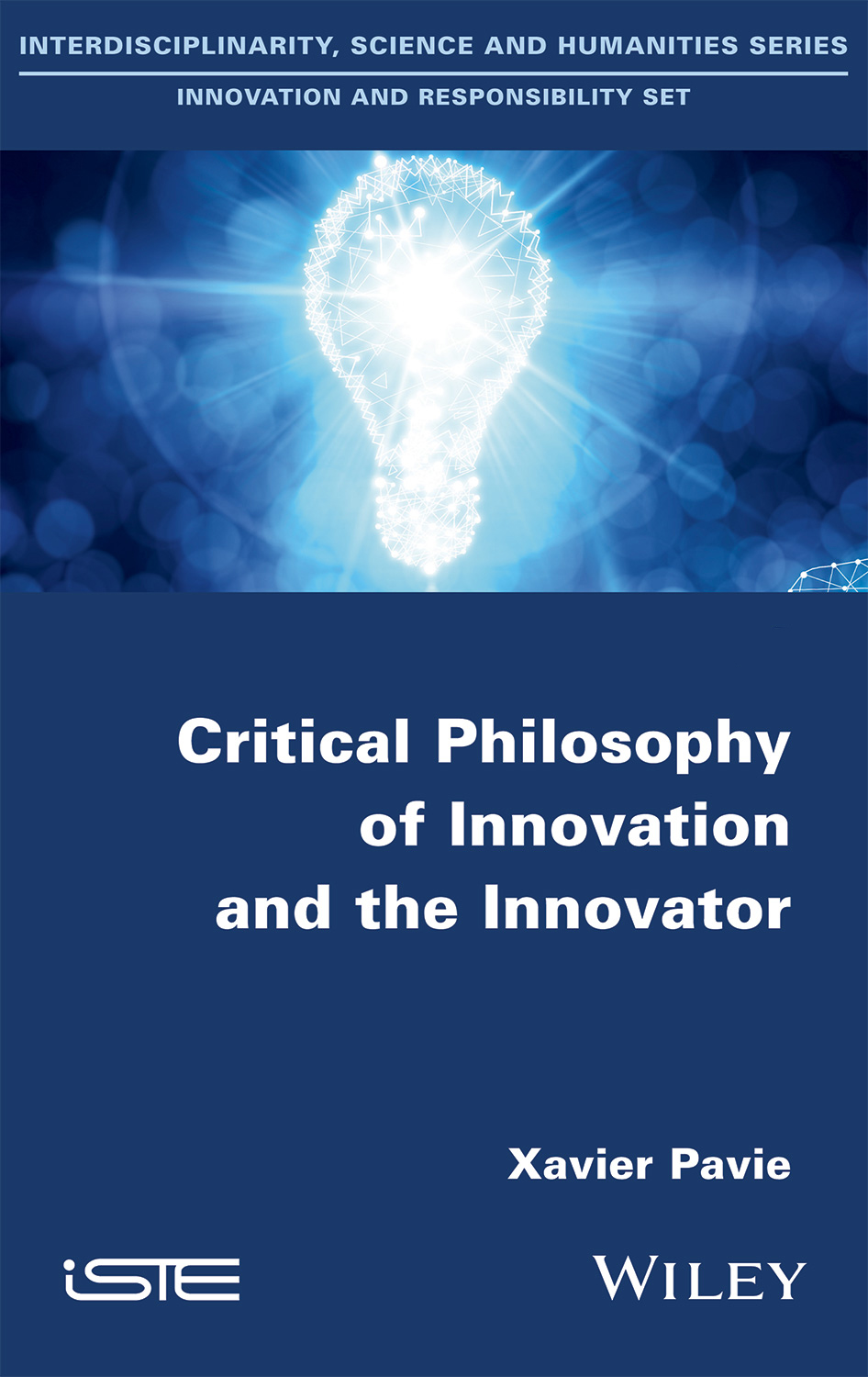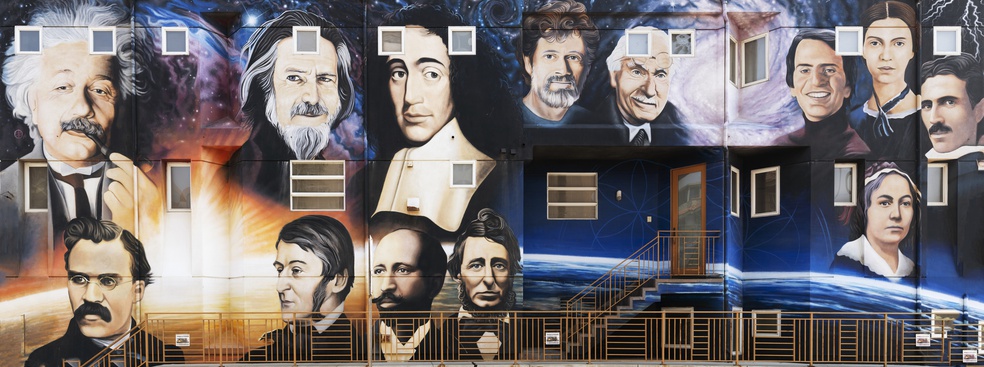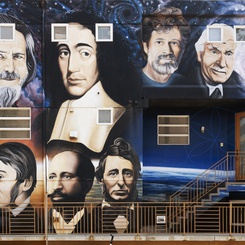Are innovators aware of their roles? Are they not crushed by an over-capitalist and ultra-liberal way of thinking about innovation?
Starting with philosophy, it is possible to think of innovation with a different perspective, outside of the usual categories of engineering and management. It is with philosophy that innovation can be (re)viewed to be more responsible, more ethical, and more humanist, as philosophy can be healing as well as preventative, cathartic as well as therapeutic.
There are three proposed axes for reflection. The first aims to challenge the essence of innovation and even its very definition, with the use of non-standard philosophy ; the second uses husserlian phenomenology for a thorough analysis about what we accomplish when we innovate: and the third emphasizes to philosophical, spiritual exercises and the necessity of training innovators on self-care and techniques for considering the consequences of their actions.
Critical Philosophy of innovation and the innovator
Attempting to formulate a philosophy that critiques innovation and the innovator is no small feat. Innovation and the innovator are broad, which, while they do not have various meanings, are nonetheless understood differently in the common language. This may be one of the problems that we encounter with innovation and why we need to tackle it. It is by critiquing that it now seems necessary to analyze both innovation and the innovator. Criticism in the Greek sense of the word, kritikē, means the art of discerning. This discernment applies to people as well as to things and to concepts, which is why this form of criticism is most suitable for our endeavor, where concept, theory, and discipline will all be put to the test.
It is of the utmost importance that we rethink innovation, and it becomes an obligation rather than a choice if we want to preserve an authentic life. We must also ask ourselves the question: What do we want for the future of humanity? If the answer is the preservation of humanity or its advancement, innovation must be reconsidered. Otherwise, there is nothing to do, nothing to consider, innovations are already on the right path toward destructing humanity and the environment. If we must (re)think innovation, it is because innovation is sealed in a capitalist, hermeneutic theory, from which it must be extracted. For decades, innovation has been affected by a culture, by symbols, an environment, and an ecosystem that drown it in a way of being and behaving that reduces it to a device solely destined for economic production. This hermeneutic stops it from thinking: all it can do is act and be a tool for production. If we are to qualify this hermeneutic, do not fear asserting that it is capitalist in essence. To attempt to (re)think innovation, we need to formulate ideas that are outside the box. Specifically, we need to think about innovation with fresh eyes. This will help us redesign innovation with the ultimate goal of integrating more responsibility, ethics, and humanism.
Thinking about innovation with its own methods and the standard deconstruction methodology will not suffice. For one thing, that has already been done, and for another, there is a risk that this does not allow us to be in the necessary headspace for reconstruction. In other words, the shackles of innovation are such that they might lead us to think that this is conceivable (or re-thinkable) in an independent and unbiased way, but this is not the case.
It is thus indispensable to (re)think innovation using tools that are more appropriate and that differ from the way that we normally think about innovation, both with regards to engineering and management. The challenge lies in thinking about innovation, or rather, (re)thinking innovation, from a philosophical perspective. First, we must (re)think using certain philosophies, as they are not all appropriate for the work we wish to undertake. Second, the term “philosophy” itself must be reviewed to make sure it is appropriate. In other words, we will be left with more questions than answers more than once. That is why (re)thinking innovation is in parentheses. These parentheses express suspense and doubt. Can we really rethink innovation? Are our tools and methods powerful enough for that? Further, we need to protect the worldliness of innovation and its lieutenants (capitalist and liberal economies, companies, political systems), who, for their own purposes, do not want to (re)think innovation.
(Re)thinking innovation through philosophy
The hypothesis that we are formulating is that philosophy can probably come in handy given its qualities, its devices, its techniques and its experience. That being said, the singular “philosophy” is too generic for our purposes, especially since “philosophy” is really comprised of different “philosophies”, in the same way that “innovation” would be more accurately referred to as “innovations”.
With regards to innovation, three particular thoughts seem especially relevant for (re)thinking innovation, three philosophies that are not by their foundations or their approaches and emerged at different times. The disciplines, the techniques, and the thoughts of non-standard philosophy, phenomenology, and spiritual exercises will dictate the structure of our endeavor. They seem especially pertinent to achieving our goal of “rethinking”. Further, these three propositions will, we hope, allow us to “break down”, “think”, and “build” innovation for a better future. Because we must be clear: these approaches do not aim to "evolve" innovation and to be "satisfied" with a new innovator who is more "philosophical", more "ethical", or even more "responsible" when implementing his innovations and who would not call innovation into question in an ontological way. Rather, the goal here is to (re)think innovation itself, to question its very essence, and it is for that reason that we need philosophies like the ones we suggest broaching. (Re)thinking innovation must have a real, concrete end. We must be oriented towards the pragmatic, i.e. the innovators themselves, both current and future.
The foundations of non-standard innovation
What could a hypothesis for non-standard innovation really cover? If there was non-standard innovation thinking, i.e. a focus on the orchestration of vital devices without simple adjustments to current processes, then the crushing would be absent or slowed at the very least. It would seem that this suggestion bridges the gap in thinking and leaves room for innovation and its most hegemonic characteristics. The hypothesis of non-standard innovation would avoid a pseudo-Parmenid overpowering, which is that being and thinking are the same; today, innovation is being, since there is no thinking. More than being, innovation is Reality, thinking is completely negligible. In fact, a non-standard innovation makes it possible to insert oneself into gaps that make it impossible to overpower, but above all to begin to glimpse a path where thought can become a counterweight to innovation in Reality. The same person can then continue to be and think, but this time by combining doing and thinking. In other words, there is no doubt that thought must come together with innovation, from which it is excluded today. And it is indeed an association between doing and thinking. For it is not a question of no longer "doing", but of doing with thought, with conscience to put it differently. This means that innovation must no longer simply be conviction and affirmation, but must be conceived, developed, implemented, launched and experienced with arguments and reflections, with conscience and doubts, with questions and hypotheses.
The existence of non-standard innovation can and does take various forms in various places. It is thus possible to make it active and make possible the removal of the current innovation authority. Its use is therefore just as important in medical schools, for example, as it is in research and development centres, and its presence has just as much meaning in commercial (or non-commercial) organizations as in management sciences. The foundations of non-standard innovation must be found in an academic sphere as well as in a practical ecosystem. This contribution should make it possible to think about innovation in a new way, to think about how we innovate without being constrained by the outdated and ill-adapted methods of the past, so that we can innovate for the common good. To do so, we must produce texts, a common language, and teachings, as those are the vehicles of change. The material is still to be produced and developed. Here, we are laying the first stone. We must keep three traits in mind while coming up with this material, traits that qualify the non-philosophical practice that we are co-opting: freedom, rigor, and generality. Freedom is a first major pillar. All (re)thinking of innovation must be done freely. This is to avoid undue manipulation from organizations with ulterior motives, and also to succeed in thinking autonomously without being influenced by a history that is too heavy, too charged, and makes us doubt questioning it. This freedom vis-à-vis innovation will allow for new material to emerge to usher in non-standard innovation. As such, we can redefine innovation, and not just from a philosophical angle, but also considering medical, architectural, scientific, artistic, and gastronomic perspectives, rather than exclusively the “business” side of affairs.
Innovation has been caught in permissive, selfish clutches, and has come under shareholder pressure, seen only as a means of generating profit. This is all the more harmful since many innovators have taken care to put in place proposals and solutions for the common good. Nonetheless, it is only a minority of innovators, and the critique that we are formulating concerns the vast majority of innovations. To draw a parallel with Laruelle’s non-standard philosophy, Laruelle’s reproach to philosophy is that it did not accomplish its goals by only thinking about itself and by having only pretensions of thinking about the objects and themes it supposedly considers. To get out of this paralyzing situation, he had to develop a method of radical thinking that goes beyond philosophy, even if philosophy is its primary material. The same goes for innovation, there is a requirement to go beyond one’s comfort zone in a radical way and to keep an eye on its accomplishment. This cannot be a standalone action. It must take another form – non-standard innovation, and must include other disciplines and maintain rigor in its purpose of working toward the common good and taking care of its environs.
Phenomenology and innovation?
In analyzing these first elements, phenomenology does not seem to offer the necessary attributes to be considered as a path for rethinking innovation. The search for truth, access to "the things themselves", and analysis of experiences do not seem to be obvious elements to characterize a "new" innovation. However, when we look more closely at the elements of phenomenology, namely questioning one’s understanding of the world, demand for astonishment, questioning our surroundings, and the obsession in the broad sense of understanding the world, we can see that these also seem relevant for (re)thinking innovation. This makes all the more sense if we also question the innovator, i.e. the individual who innovates. Who is surprised? Who welcomes the world? Where does this awareness of the world and its analysis of experiences come from?
It is by nature the work of mankind, the innovator, and it is through the innovator that phenomenology applies. It is perhaps up to the innovator to no longer innovate, but to focus on learning, to not innovate but to live: in other words, to put oneself in a position that is not limited to a work contract or workplace and where activity can continue without stops or limits.
To ask the question of phenomenology in order to (re)think about innovation is to ask not only that the knowledge of things themselves is an exercise that can contribute to the improvement of things themselves, but also that to access this knowledge, it is necessary and fundamental first to know how to question oneself. In other words, it is to ask oneself how to know. Instead of considering a reflection on the effects of innovation (performance, consequences or profit), it would rather be a question of questioning the knowledge of innovation. Why does it exist? Should it exist? But also who generates it? Why? As a result, we could influence the phenomena. We propose to pause on the method of phenomenology and go over its constitution, its theories, and its methods of implementation, and to systematically tackle each dimension, to measure a possible contribution to (re)think innovation.
Spiritual exercises for the contemporary world
From the beginning, philosophy has been a spiritual exercise: its primary challenge lies in challenging oneself to better face obstacles in life. When we practice spiritual exercises, they allow us to take care of our souls, not in a psychoanalytic way, which, though it is inspired by the techniques of the Ancients, is concerned practically only with neuroses and working the unconscious, and considers that any disorder has a sexual origin through the restriction of the libido. Spiritual exercises are like medicine, like therapy, as they allow us to live the best way possible; or perhaps more accurately, as painlessly as possible. It is clear that taking care of oneself is not selfish, it is done with, by, and for the community. If this practice is in this piece limited to innovators, it is nonetheless fundamental for everyone. Both in theory and practice, the spiritual exercises of the Stoics, Epicureans and Cynics underscore the whole of Hellenistic and Roman philosophy, even if, as mentioned above, these exercises were sometimes taken up by Christianity, mishandled, or misinterpreted.
These exercises for developing spirituality endured past Antiquity, and the words of the Ancients have a universal reach. It would be naive to not take into account the necessity of these spiritual exercises for our times. Regardless of the school of thought (stoicism, epicurean, cynicism), the propositions resonate with contemporary needs. Pierre Hadot highlighted this clearly: "In my opinion, the model of ancient philosophy is still current, which means that a quest for wisdom is always current and always possible. I would only say that there are, it seems to me, universal and fundamental attitudes of the human being when seeking wisdom...". It is a mistake to read Pierre Hadot only for the reserved domain of philosophy. Philosophy is not only for philosophers.
Spiritual exercises need to gain a foothold in contemporary events, and innovation, with its consequences and implications for daily life, is an excellent breeding ground for this. The power of the ancient spiritual exercises that find themselves present in our present world requires at the very least that we pay homage to them by using them. And there is no better way to use them than by confronting them with a certain terrain that currently seems in need of some wisdom.
Philosophy, the ultimate aid for innovation
The benevolent world we aspire to has yet to emerge; international political organizations continue to hold summits and conventions, to produce agreements and treaties, with the aim of reducing the negative consequences of human activities in the context of economic growth. Nothing is done, for a simple reason: these political organizations and country governments have only a relative influence on the massive private organizations that are more powerful than many States. What’s more, the means for reducing harm are insufficient when it comes to convincing an electorate that refuses to consider the fundamental changes needed. From a local or sectoral point of view, the authorities are outdated and laws and regulations are constantly being hijacked and thwarted, not to mention the fact that innovation often comes before the law. The fines, which can be counted in billions of euros, are not a deterrent for firms whose revenues are much higher in the medium or long term. How can we do good when legislation, regulation and deterrence have no effect? What tool should be put in the hands of innovators so that they act for the common good while taking care of themselves and others?
The basis of the thesis developed here is that philosophy must play this role. Unbiased, on a quest for wisdom, searching to understand and take care of the world, philosophy seems like the last resort for a better world. While sometimes it is mocked, mistrusted, caricatured, and considered overly theoretical and useless, it may prove to be the key to our future. This discipline has endured over time and is essential to understand complexity and fundamental to make us reflect on what we are doing. Its methods, theories, and expertise will prove useful for problem-solving in a world where no one listens or is listened to. The story of philosophy is one in which we look at obstacles and difficulties to understand what has happened, what is happening, and what will happen. Philosophy knows how to take a step back to question, problem-solve, and decipher the complexity so that it is intelligible for those who make an effort.
Xavier Pavie, Philosophie critique de l’innovation et de l’innovateur, ISTE édition, mars 2020. Translated: Xavier Pavie, Critical Philosophy of Innovation and the Innovator, Wiley, June 2020.










